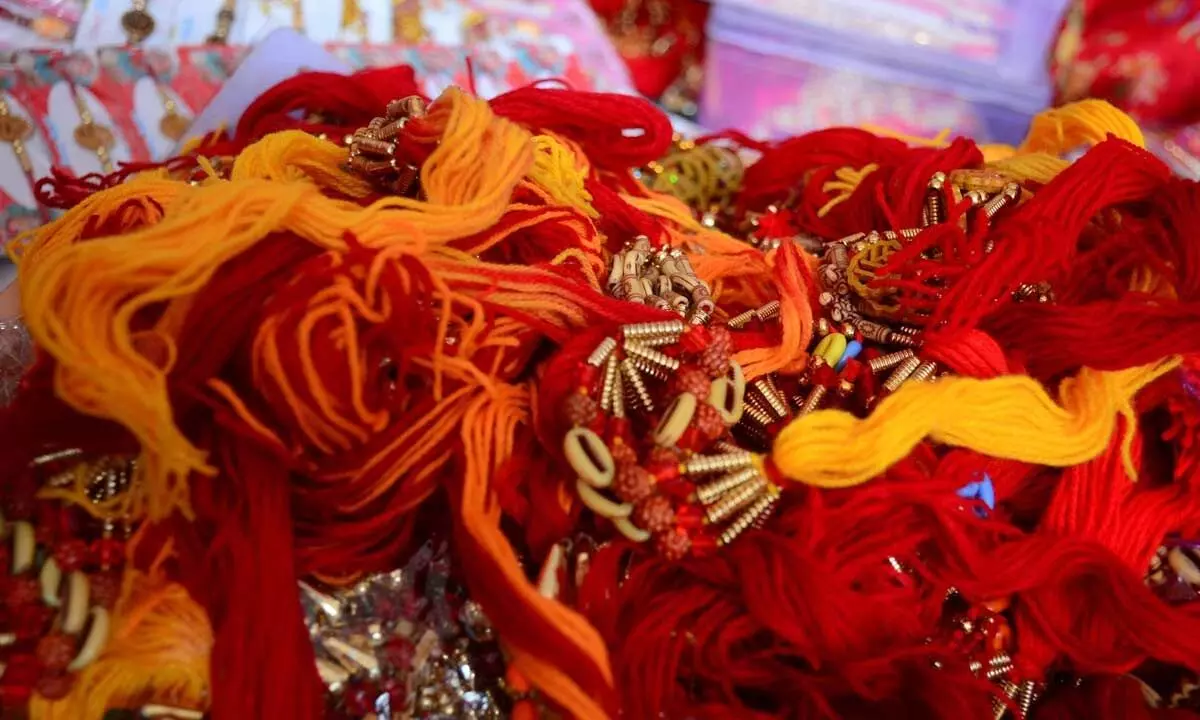Live
- 10 Tried-and-Tested Home Remedies for Toothaches
- Thila Taila Abhishekah Pooja to Lord Shaneswara
- Sudheer Babu’s ‘Harom Hara’ set to release on this auspicious day
- Priyanka Gandhi says BJP talking of 'tinkering' with Constitution with PM’s nod
- Vishwak Sen unveils gritty avatar as ‘Lankala Rathna’ in ‘Gangs of Godavari’ teaser
- ‘Kalki 2898 AD’ locks release date; film to entertain audience from June last week
- LS polls: PM Modi says BJP-NDA leading 2-0 after first two phases
- Plea in Madras HC seeks special polling arrangement for names 'missing' from Coimbatore voter list
- Ex CM KCR Bus tour on 4 th day
- Youth National Games 2024 kick-start in Delhi; over 5,000 athletes from 15 states vying for top honours
Just In
Hyderabad: Ahead of Raksha Bandhan, cow dung rakhi fast catching up among citizens


As Raksha Bandhan approaches, the markets are abuzz with an array of lively and colourful rakhis. In addition to these, a handful of artisans in the city have introduced cow dung rakhis.
Hyderabad: As Raksha Bandhan approaches, the markets are abuzz with an array of lively and colourful rakhis. In addition to these, a handful of artisans in the city have introduced cow dung rakhis. This innovative choice stems from the natural, biodegradable nature of cow dung, which also has antimicrobial properties.
According to the rakhi artisans, this year has witnessed a notable increase in the popularity of eco-friendly rakhis, alongside the fancier options.
Notably, these environmentally conscious rakhis have garnered attention not only within Telangana but also across India, with orders pouring in from various regions. Further, these rakhis are affordable, ranging from Rs 10 to Rs 15, making them a pocket-friendly choice for many.
Dr Padma, member of Murlidhara Anusandhana Govingana Kendranm, said, “Only during the festival of Rakhi, sisters tie rakhi to their brothers but just after few days after the festival, these rakhis end up in landfills, and most of these rakhis are made of plastic that is harmful to the environment, so we have come up with cow dung Rakhi which is a natural, biodegradable material that is also known to have antimicrobial properties. After the festivals also, people can use it as a fertilizer, a mosquito repellent or as a decorative item, an anti-radiant device.”
Over the past four years, our rakhi-making endeavors have revolved around the use of fresh cow dung. Following a meticulous process, the dung is first dried and shaped into the desired forms. Subsequently, intricate designs are hand-painted onto the rakhis using natural dyes.
These rakhis are then adorned with a white and red thread, symbolizing auspiciousness. Encouragingly, this year has witnessed a gradual surge in demand compared to the previous year. Notably, orders have poured in from regions including Karnataka, Andhra Pradesh, and Chennai. An intriguing incident unfolded as two sisters from Karnataka requested a batch of 100 rakhis to be sent to Army officials, marking a remarkable gesture.
K Srinivas Prasad, Sri Sankara Vidyabharathi Gowsmrashana Charitable Trust, said, “With a steadfast commitment to shun inorganic elements in favor of organic alternatives, our journey of crafting rakhis spans four years. These rakhis, a creation of self-help group women, embody a core purpose – substituting synthetic materials with nature-friendly components.
Festivals and rituals inherently intertwine with the science of safeguarding nature, nurturing human relationships, and preserving health and biodiversity. The cow dung rakhi stands as a symbol of these principles, highlighting our duty to conserve nature through post-ritual seed planting. Addressing a common misconception, the rakhis, once formed from cow dung, are odorless. Crafted from sacred threads, cow dung, and various organic elements, the collection boasts around 20 designs, including swastikas, flowers, om symbols, chakras, and traditional motifs. This year, the demand for these eco-friendly rakhis has surged remarkably, extending even to international borders; orders have been received from the USA three months ahead of the festival.”
“Along with fancy rakhis, this year people are also preferring eco-friendly Rakhi, especially cow dung Rakhi, as it is made with organic product, once the cow dung dries, it is mixed up with dry beans powder and then various designs are given. They are also affordable, making them a popular choice for people of all budgets. It starts from Rs 15,” said Suresh, a Rakhi Seller, Secunderabad.

© 2024 Hyderabad Media House Limited/The Hans India. All rights reserved. Powered by hocalwire.com






